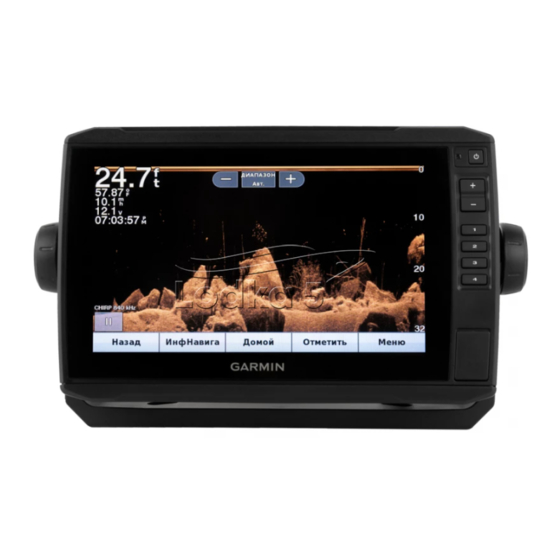Garmin echomap 90 series Руководство пользователя - Страница 19
Просмотреть онлайн или скачать pdf Руководство пользователя для Морская система GPS Garmin echomap 90 series. Garmin echomap 90 series 30 страниц.
Также для Garmin echomap 90 series: Инструкции по установке (4 страниц), Инструкции по установке (4 страниц), Руководство пользователя (50 страниц)

1
From a sonar view, select MENU > Sonar Setup > Scroll
Speed.
2
Select an option:
• To adjust the scroll speed automatically using speed-over-
ground or water speed data, select Auto.
The Auto setting selects a scroll rate to match the boat
speed, so targets in the water are drawn with the correct
aspect ratio and appear less distorted. When viewing
DownVü or SideVü sonar views, it is recommend to use
the Auto setting.
• To use a very fast scroll speed, select Ultrascroll®.
The Ultrascroll option quickly scrolls new sonar data, but
with a reduced image quality. For most situations, the Fast
option provides a good balance between a quickly
scrolling image and targets that are less distorted.
Sonar Frequencies
NOTE: The frequencies available depend on the transducer
being used.
Adjusting the frequency helps adapt the sonar for your particular
goals and the present depth of the water.
Higher frequencies use narrow beam widths, and are better for
high-speed operation and rough sea conditions. Bottom
definition and thermocline definition can be better when using a
higher frequency.
Lower frequencies use wider beam widths, which cover a larger
area and can let the fisherman see more targets, but could also
generate more surface noise and reduce bottom signal
continuity during rough sea conditions. Wider beam widths
generate larger arches for fish target returns, making them ideal
for locating fish. Wider beam widths also perform better in deep
water, because the lower frequency has better deep water
penetration. They can be used to search for structures such as
brush piles.
Selecting Frequencies
NOTE: You cannot adjust the frequency for all sonar views and
transducers.
You can indicate which frequencies appear on the sonar screen.
1
From a sonar view, select MENU > Frequency.
2
Select a frequency suited to your needs and water depth.
For more information on frequencies, see
Frequencies.
Creating a Frequency Preset
NOTE: Not available with all transducers.
You can create a preset to save a specific sonar frequency,
which allows you to change frequencies quickly.
1
From a sonar view, select MENU > Frequency.
2
Select Add.
3
Enter a frequency.
Turning On the A-Scope
NOTE: This feature is not available in all sonar views.
The a-scope is a vertical flasher along the right side of the full-
screen sonar view. This feature expands the most recently
received sonar data so that it is easier to see. It can also be
helpful for detecting fish that are close to the bottom.
From a sonar view, select MENU > Sonar Setup >
Appearance > A-Scope.
Sonar Setup
NOTE: Not all options and settings apply to all models and
transducers.
Sonar
Sonar Settings
NOTE: Not all options and settings apply to all models, sounder
modules, and transducers.
From a sonar view, select MENU > Sonar Setup.
Depth Line: Shows a quick-reference depth line.
Scroll Speed: Sets the rate at which the sonar scrolls from right
to left.
In shallow water you might want to slow the scroll speed to
extend the length of time the information is displayed on
screen. In deeper water you can increase the scroll speed.
Range Lines: Shows the vertical lines indicating the distance to
the right and left of the boat. This setting is available for
SideVü sonar view.
Color Scheme: Sets the color scheme of the sonar view. This
setting might be available in the Appearance menu.
The high contrast color schemes provide darker color
assignments to the low intensity returns. The low contrast
color schemes provide color assignments to the low intensity
returns that are similar to the background color.
Appearance: See
Overlay Numbers: Sets the data shown on the sonar screen.
Advanced: See
Installation: Restores the default sonar settings.
Sonar Appearance Settings
NOTE: Not all options and settings apply to all models and
transducers.
From a Sonar view, select MENU > Sonar Setup >
Appearance.
Color Scheme: Sets the color scheme.
Edge: Highlights the strongest signal from the bottom to help
define the hardness or softness of the signal.
A-Scope: Displays a vertical flasher along the right side of the
screen that shows instantaneously the range to targets along
a scale.
Pic. Advance: Allows the sonar picture to advance faster by
drawing more than one column of data on the screen for
each column of sounder data received. This is especially
helpful when you are using the sounder in deep water,
because the sonar signal takes longer to travel to the water
Sonar
bottom and back to the transducer.
The 1/1 setting draws one column of information on the
screen per sounder return. The 2/1 setting draws two
columns of information on the screen per sounder return, and
so on for the 4/1 and 8/1 settings.
Fish Symbols: Sets how the sonar interprets suspended
targets.
Advanced Sonar Settings
NOTE: Not all options and settings apply to all models and
transducers.
From a sonar view, select MENU > Sonar Setup > Advanced.
Interference: Adjusts the sensitivity to reduce the effects of
interference from nearby sources of noise.
The lowest interference setting that achieves the desired
improvement should be used to remove interference from the
screen. Correcting installation issues that cause noise is the
best way to eliminate interference.
Surface Noise: Hides surface noise to help reduce clutter.
Wider beam widths (lower frequencies) can show more
targets, but can generate more surface noise.
Color Gain: See
TVG: Adjusts the appearance of returns to compensate for
weakened sonar signals in deeper water, and reduces the
Sonar Appearance
Settings.
Advanced Sonar
Settings.
Adjusting the Level of
Detail.
15
